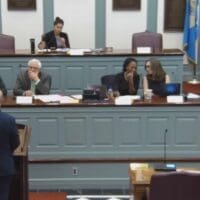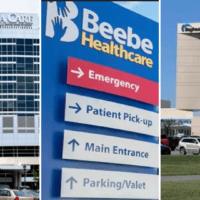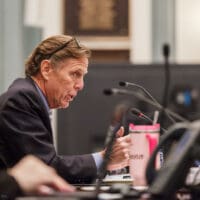

Delaware State students soon will have access to financial training throughout their college years and beyond.
A four-year grant from Charles Schwab will allow Delaware State University to launch a Financial Literacy Institute that will work with thousands of students a year from high schoolers, to DSU students, to graduates.
The goals are to help minorities learn more about how to build wealth, as well as beef up financial investment and certified financial planning classes into a major that will provide minority candidates for an industry that is largely White.
The four-year partnership with Schwab Advisory Services and Charles Schwab Foundation will help hire faculty and staff expected to serve up to 1,500 college freshmen throughout their career, 2,500 upper classmen and 2000 graduates, as well as reaching out each year to 1,500 high school juniors and seniors from New York to Washington, D.C.
Neither the school nor Schwab would say how much the grant is, which is Schwab’s custom. For comparison purposes, DelTech last week announced a $400,000 Barclays grant that will put 200 students through certification courses to help them get a job, or better job.
“This partnership is exciting because the need to improve the financial planning and wealth management skills of our students is essential to our core mission of changing their life trajectories,” said University President Tony Allen in a press release.
“It is potentially devastating to realize that families of color amass wealth at a rate seven times below that of white families, and that in the wake of COVID this gap is increasing. Our education of these young people has to include top-flight training in how to acquire, manage and grow their wealth, whether they’re becoming teachers, scientists or joining an independent advisory firm.”
The new institute, which has been dubbed FLi, grew from conversations between Dr. Nandita Das, a DSU professor of finance, and a friend at Schwab.
Das believes high schools don’t provide practical money education for their students, who arrive at college knowing little about the way finances work personally or on a larger scale. At the same time, she said, most financial advisors are seeking clients who have large amounts of money, while people who are just starting out in life really need the advice to build that wealth.
Many incoming DSU students arrive not knowing that a loan needs to be repaid, how to handle a checkbook or how a credit card really works, much less how mishandling finances can lead to credit score and other trouble that can handcuff them for years, if not life, she said.
“That doesn’t mean at the university level, we say, ‘You know what? That’s not our problem,’” Das said. “As university people we are trying to make sure we it’s not just teaching finance, it’s about making sure we prepare them to be good citizens. We want to make sure that they’re financially literate.”
Das — who has a Fulbright scholarship to study the growth of socially responsible investing in India — hopes to be able to reach both students and their parents.
Students outside DSU’s financial planning curriculum, and high schoolers in the region, will be approached through a series of mini courses, activities, seminars and mentorings that will go on throughout the years.
Das said the school plans to create an advisory committee of educators and non-profit, regulatory and private sector organizations to guide and promote the effort.
Some of the financial advice will be straight forward: “I always say don’t get credit card for the free T-shirt,” Das said. Other training will into the murky waters of personal choice and how a person’s goals may guide the way they spend or invest money.
Das said that when she talked with investment and financial advisors, they usually point out that nobody is coming out of the college pipeline for their jobs.
“Nobody’s going to come out of the pipeline unless people get into the pipeline,” Das said. “So that’s where we state with high school people. If you ask students what they want to be, they will say, ‘I want to be an electrical engineer,’ ‘I want to be a doctor,’ ‘I want to be a plumber,’ ‘I want to be a carpenter.’ Nobody says, ‘I want to be a financial planner’ because they don’t even know that such a thing exists.”
Among other things, the Schwab grant also will renovate the Financial Network Trading Room operated by the University’s College of Business.
“Any time we can join with academia to bring more awareness to the Registered Investment Advisor profession, and do our part in helping to create interest among students, we are all in,” said Bernie Clark, head of Schwab Advisor Services, in a press release. “It is incredibly important that we build a pipeline of diverse and high-quality professionals for independent advisory firms to hire in the future, and we are thrilled with the efforts underway at Delaware State University that we believe will make that a reality.”
The partnership specifically will support the College of Business in expanding its financial management programming for Business majors. The tools and resources provided by the new institute will allow students to learn more about wealth management, build relationships with industry leaders, learn about careers in the Registered Investment Advisor profession, and help foster community outreach.
The University is in the process of converting its minor in financial planning into a full-fledged financial planning and wealth management degree concentration.
“We’ve not been able to offer the program at full potential yet,” said Das. “The infusion of Schwab’s expertise and support allows us to complete that project to the benefit of our students.”
Dr, Michael Casson, dean of the College of Business said programming and counseling will be offered to high-school students and their families across DSU’s primary recruiting area, which includes Delaware, Pennsylvania, Maryland, New Jersey, Washington, D.C., and New York City.
“This engagement continues as new students move through the enrollment and financial aid process, then is interwoven into course, workshops, certification, experiential learning and degree offerings while they are here,” he said.
It also will offer alumni access to workshops and counseling focused on wealth management, Das said.
“What the Schwab support gives us is the resources to impact our students and alumni over the course of their lives, to become a consistent, sustaining resource,” Das said. “This is the magic of the multiple touchpoint approach.”
Allen said that DSU’s own Early College High School, which allows high school students to take college courses, had taught the Historically Black College and University that it needed to break down barriers between kindergarten to 12th grade schools and higher education to reach young people holisitically.
“What makes this partnership so innovative,” Casson noted, “is the active role that Schwab will play, especially in the critical foundation elements of high-school outreach. With their support our first objective is begin training programs for 1,500 high school juniors and senior across our catchment area, and our Charles Schwab FLi Champions will follow them into the University as new Freshmen.”


Betsy Price is a Wilmington freelance writer who has 40 years of experience.
Share this Post










